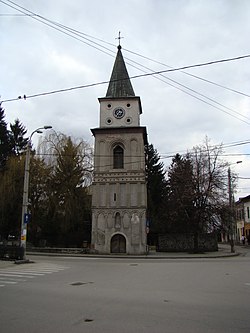Câmpulung
Câmpulung | |
|---|---|
Municipality | |
 A clock tower | |
| Country | |
| County | Argeş County |
| Status | Municipality |
| Government | |
| • Mayor | Andrei Călin |
| Population (2002) | |
| • Total | 38,209 |
| Time zone | UTC+2 (EET) |
| • Summer (DST) | UTC+3 (EEST) |
| Website | http://www.primariacampulung.ro/ |
Câmpulung (also spelled Cîmpulung, Romanian pronunciation: [kɨmpuˈluŋɡ]), or Câmpulung Muscel, is a city in the Argeş County, Muntenia, Romania. It is situated among the outlying hills of the Carpathian mountains, at the head of a long well-wooded glen traversed by the Râul Târgului, a tributary of the Argeş.
Its pure air and fine scenery render Câmpulung a popular summer resort. In the city there are more than twenty churches, besides a monastery and a cathedral, which both claim to have been founded in the 13th century by Radu Negru, legendary first Prince of Wallachia.
History
Câmpulung was one of the earliest urban settlements in Wallachia, the Transylvanian Saxons contributing to its development by bringing the German urban culture. The earliest written evidence of the town's existence is dated 1300, and is to be found in the Câmpulung church. The inscription is an epitaph of Laurencius de Longo Campo, the mayor of the German community, the full text being Hic sepultus est comes Laurencius de Longo-Campo, pie memorie, Anno Domini MCCC ("Here is buried Laurentius of Longus-Campus, in pious memory, Anno Domini 1300").
Câmpulung was the first capital of the feudal state of Wallachia, until succeeded by Curtea de Argeş in the 14th century. There was a considerable traffic with Transylvania, over the Bran Pass, 15 miles to the north, and with the south by a branch railway to Ploieşti.
Near Câmpulung are the remains of a Roman camp; and just beyond the gates, vestiges a Roman colony, variously identified with Romula, Stepenium and Ulpia Traiana, but now called Grădiştea or Jidovi.
"Câmpulung" literally means "Long Field" in Romanian.
Population
- 1900: 13,033
- 1992: 44,125
- 2002: 38,209
- 2010: 39,454


